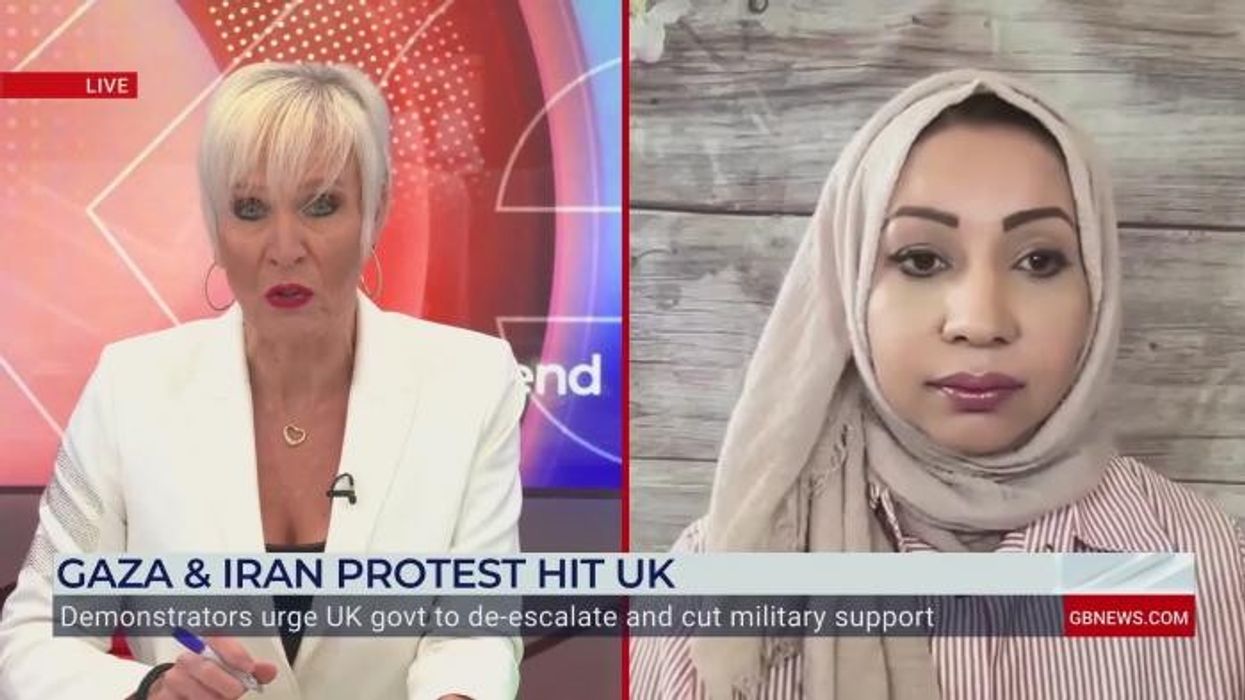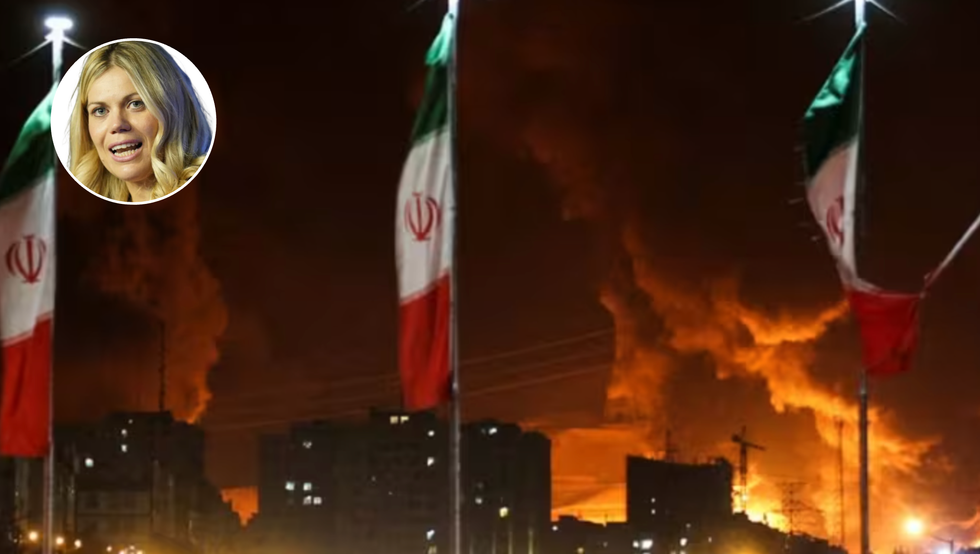While the West clings to dangerous idealism, Israel confronts reality. We must act now on Iran – Miriam Cates

Huge row erupts on GB News over Israel-Iran war |
GB
OPINION: The West's naivety has allowed Iran to edge dangerously close to acquiring nuclear weapons
Don't Miss
Most Read
Trending on GB News
Israel and Iran are at war. Despite international calls for restraint and diplomacy, including from our own Prime Minister, Israel has acted decisively - perhaps necessarily - against a regime it believes poses an existential threat.
This move is a direct affront to the Western belief, increasingly dominant in recent decades, that military action should always be a last resort. That mindset has allowed the Islamic Republic of Iran to edge dangerously close to acquiring nuclear weapons, an outcome that could trigger catastrophic consequences for the region and the world.
The International Atomic Energy Agency (IAEA) has recently revealed disturbing evidence that Iran’s nuclear program is nearing weapons-grade capabilities. This follows years of intelligence assessments, particularly from Israel, warning that Tehran's nuclear ambitions have never been peaceful.
Since the Iranian Revolution in 1979, Iran has been under varying degrees of international sanctions, yet this has not prevented its nuclear development. In September 2011, Iran began enriching uranium at the Fordow Fuel Enrichment Plant—a fortified, underground facility whose very existence was first exposed in 2009 through declassified intelligence from the U.S., UK, and France. These reports concluded that the site was “inconsistent with a peaceful nuclear program”.
Despite mounting concerns, the West failed to act. The Obama administration, desperate to avoid military confrontation, instead pursued diplomacy. The resulting Joint Comprehensive Plan of Action (JCPOA), signed in 2015 by Iran, the U.S., UK, France, China, Russia, and Germany, aimed to limit Iran’s nuclear program in exchange for the lifting of economic sanctions.
Israel strongly opposed the agreement. At the time, the Israeli PM Benjamin Netanyahu warned:
“This deal does not block Iran’s path to the bomb. It paves it.”
President Donald Trump echoed that sentiment, withdrawing the U.S. from the deal during his first term in office in 2018. The Trump administration reimposed sanctions, but it was too little, too late. The funds made available as a result of the lifted sanctions had already enabled Iran to pour resources into its nuclear programme and heavily arm its regional proxies: Hezbollah in Lebanon, Hamas in Gaza, and the Houthis in Yemen.
Again and again, the West ignored Israel’s warnings. In 2018, Israel’s Mossad intelligence agency executed a daring operation, seizing tens of thousands of documents from Tehran that revealed the full extent of Iran’s secret nuclear weapons development. Israel had produced undeniable proof that Iran had lied to the world about its intentions.
The appalling massacre committed by Hamas on October 7, 2023 - in which over 1,200 Israelis were brutally killed - marked a turning point. It served as a wake-up call for the Israeli government, which has since launched coordinated campaigns to degrade Hamas, weaken Hezbollah, and neutralise the Houthis.

While the West clings to dangerous idealism, Israel confronts reality. We must act now on Iran – Miriam Cates
|Reuters
With its proxy forces crippled, Iran became more vulnerable. This presented a narrow window for Israel to strike directly. And the IAEA’s latest findings, reported on 31st May, added urgency, confirming that Iran's uranium enrichment had reached levels just shy of weapons-grade.
Israel had to act before the diplomatic clock ran out. Initial signals from the Trump camp, expected to return to power in the U.S., were supportive. The U.S. even stationed B-2 bombers in Diego Garcia, the only aircraft capable of penetrating the heavily fortified Fordow nuclear facility in central Iran.
But isolationist voices in Washington began to gain ground. In April, Steve Witkoff, Trump’s special envoy, adopted an inconsistent but apparently less hardline policy that reopened the door to negotiations. New talks were scheduled for last Sunday, 15th June—talks that would tie Israel’s hands. Once underway, unilateral Israeli action would be seen as undermining its most important ally.
For Israel, it was now or never. Exploiting confusion over Trump’s position, the Israeli government crafted a ruse, leaking that Trump opposed the strikes, thereby gaining the element of surprise. The operation went ahead. Over the weekend, Israel launched Operation Rising Lion, executing many senior Iranian leaders and nuclear scientists and causing significant damage to the Natanz nuclear site. Iranian air defences were destroyed, giving the Israeli air force free rein over the skies above Tehran.
Netanyahu will have been in no doubt that Iran would retaliate, and Tel Aviv is under attack as I write. Even Israel’s world-leading air defences cannot prevent every Iranian ballistic missile from reaching its target. But it was a price that Israel calculated and accepted. Iran is estimated to have around 2000 ballistic missiles capable of reaching Israel, and, at current firing rates, it is thought the Islamic Republic will exhaust their stocks within three weeks (sooner if Israeli forces continue to destroy Iranian weapons on the ground).
Unlike the endless, grinding, unwinnable territorial war in Ukraine, the Israeli campaign has a defined objective: preventing a regime with genocidal intent from obtaining nuclear weapons.
This is not just Israel’s fight. Iran’s ambitions extend beyond the destruction of the Jewish state. The regime funds global terrorism, conducts cyber warfare, and is already suspected of plotting attacks in the UK and across Europe.
So why does Western Europe continue to bury its head in the sand? Why do our leaders still believe that diplomacy alone can contain a theocratic dictatorship committed to holy war?
Israel is much maligned for its tough stance, but its worldview is forged in necessity. This is a country built amidst the tragedy of the Holocaust and attacked from all sides by multiple Arab states the day after it declared independence. That threat never disappeared. And time after time, Israel has held off its enemies, often alone.
While the West clings to idealism, Israel confronts reality. Peace is not possible with those who seek your destruction. Peace comes only when your enemies do not possess the capability to destroy you.
Israel is not beyond reproach. The intelligence failures that allowed October 7 to happen must be scrutinised. Settlements in the West Bank are a legitimate target for criticism.
But progress has been made, especially with the Abraham Accords, which normalised relations with several Arab states. Even Saudi Arabia unofficially helped Israel by allowing overflight access during the recent missile exchange with Iran.
Yet here in the UK, the Islamic Revolutionary Guard Corps (IRGC) remains unprescribed, despite being a terrorist entity. Radical Islamic groups banned in many Muslim countries operate freely in Western democracies.
The leadership of Western Europe is still captured by the false liberal belief that people are inherently good, and that if we just keep negotiating, our enemies will eventually come around. But history teaches otherwise. Iran’s rulers are ideologically driven to destroy Israel and the West. Any leniency will be exploited to enhance their lethal capabilities.
Israel’s actions may have forestalled a nuclear-armed Iran. It will suffer consequences, but it will not be destroyed. That could well have been the outcome if the world’s only Jewish state had listened to the West and held its fire. As Netanyahu said in a recent video address: “Generations from now, history will record our generation stood its ground, acted in time and secured our common future.”
More From GB News










